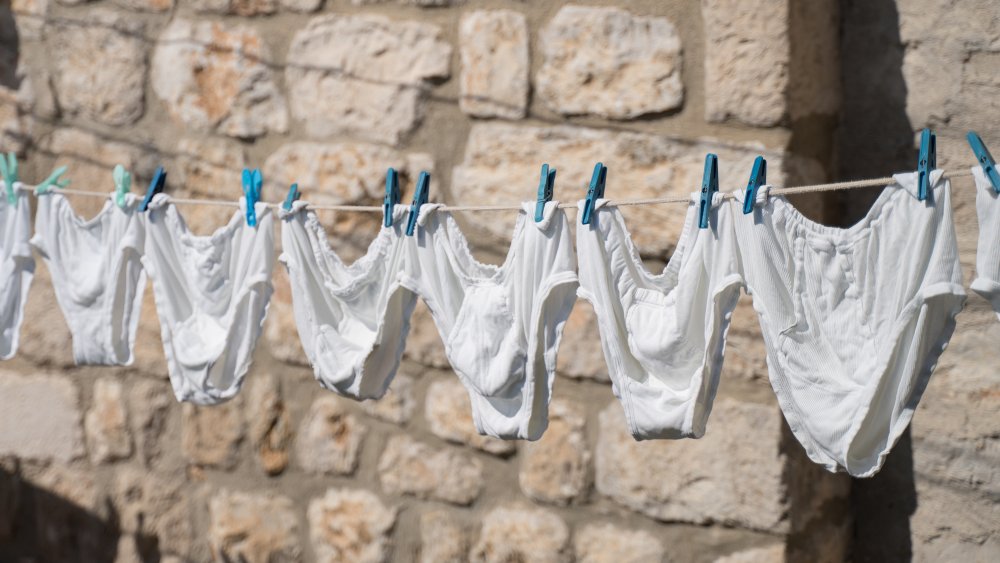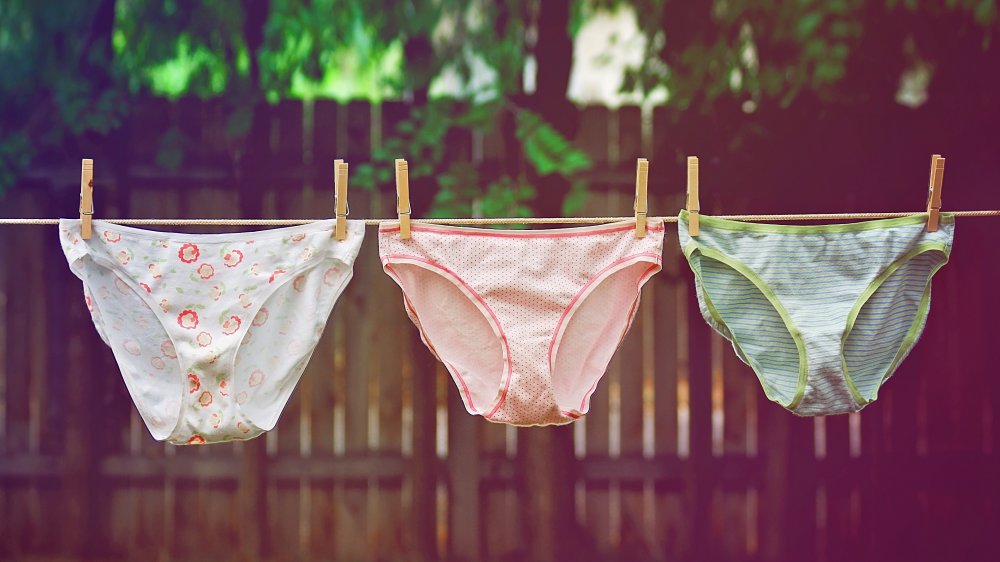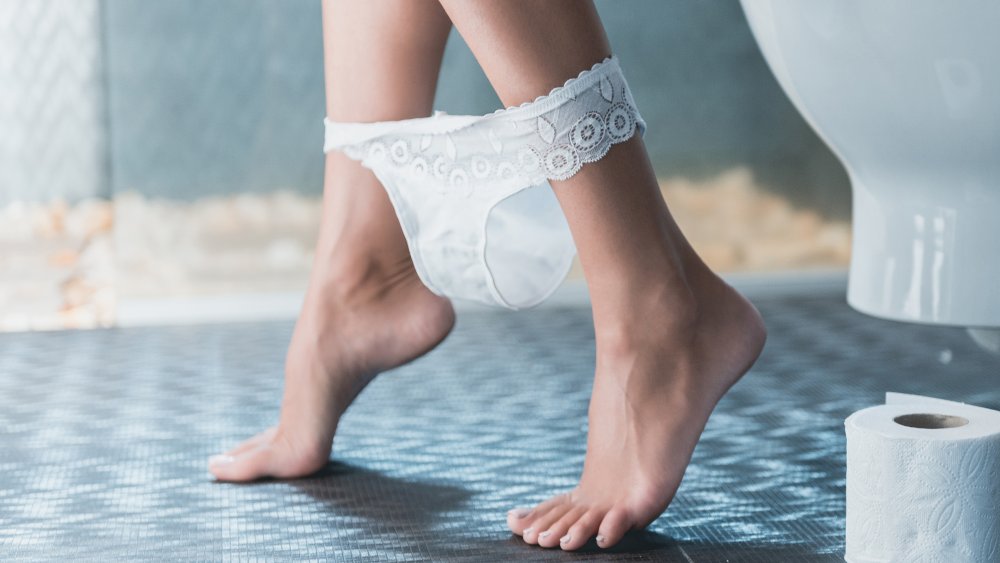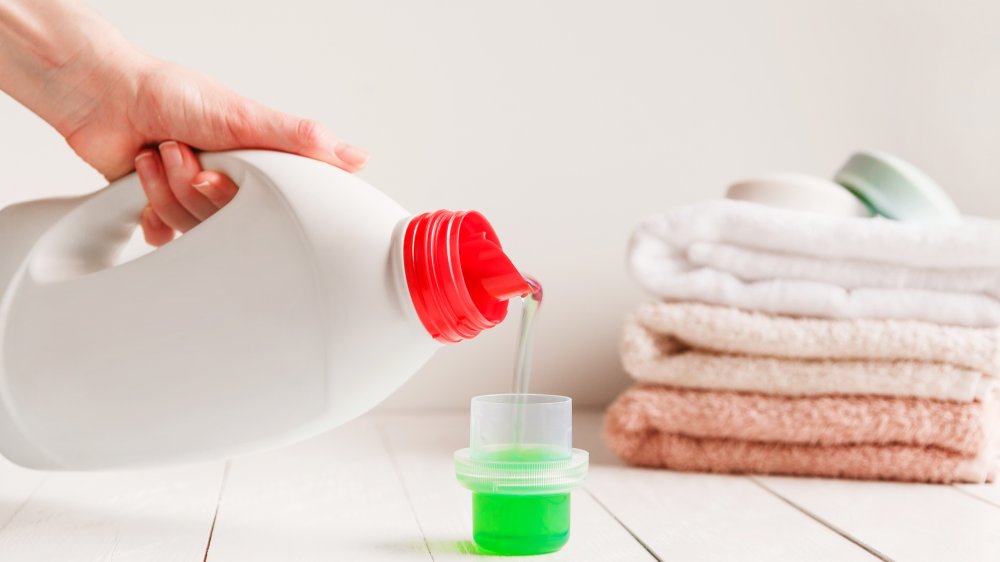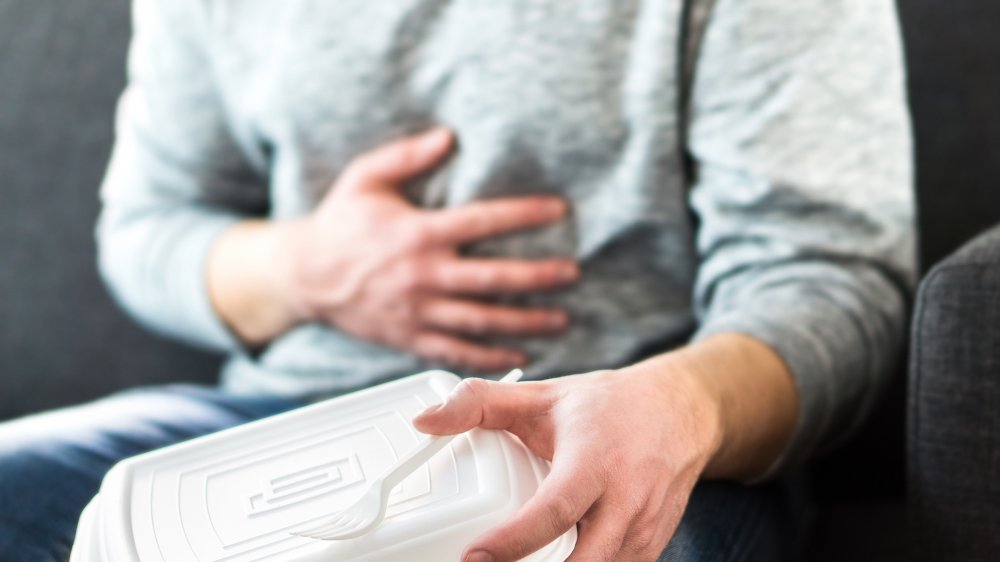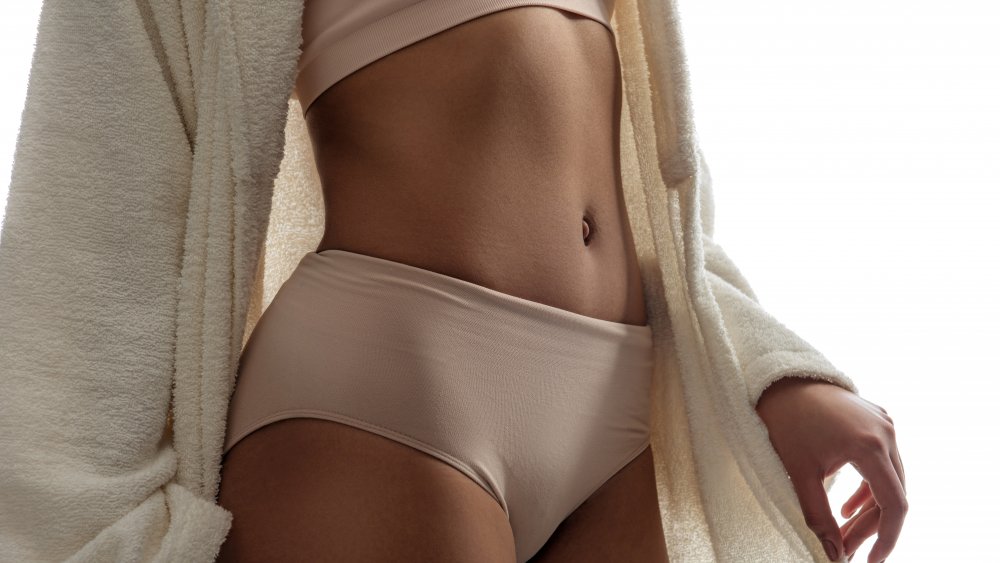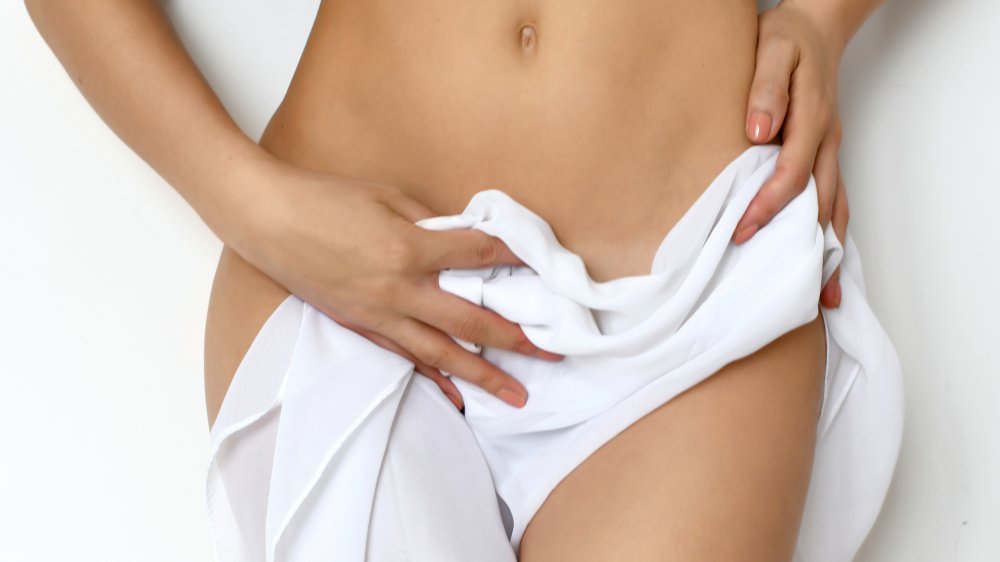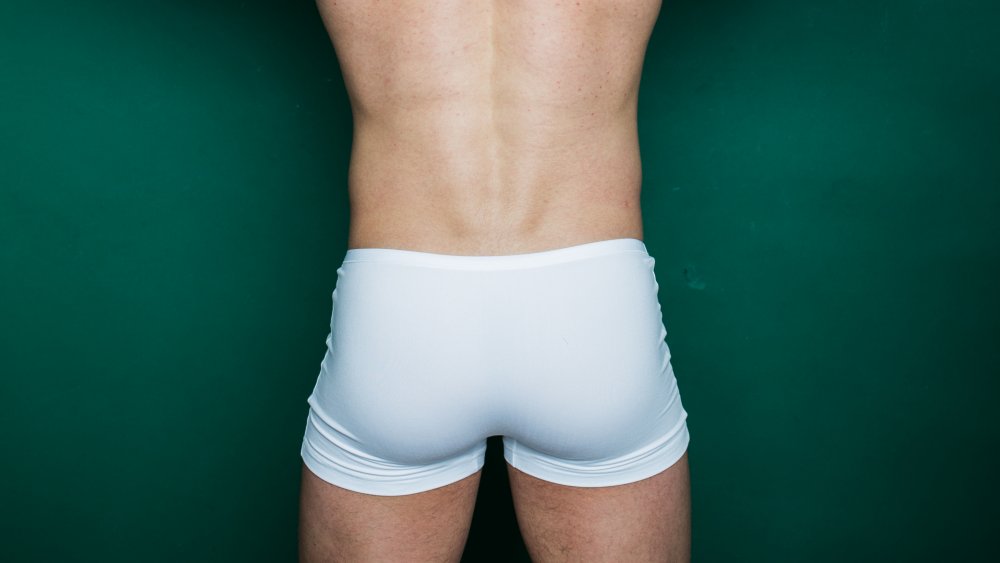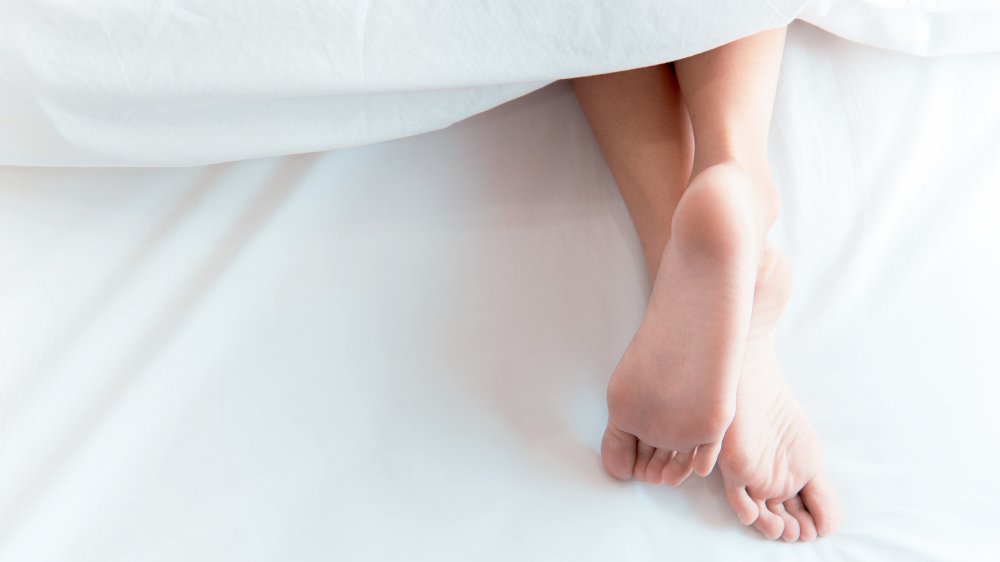What Happens To Your Body When You Stop Wearing Tighty-Whities
In the summer, it can be tempting to do away with extraneous clothing. Sleeves? Totally unnecessary. Pant legs? Those are optional. What about underwear, specifically, your constricting, body-hugging tighty-whities? Well, it turns out that wearing undies might not be as essential to your hygiene routine as you think it is.
If you're toying with the idea of ditching your tighty-whities for an easier, breezier look, you wouldn't be alone. According to a survey conducted by Vanity Fair and 60 Minutes, a whopping 25 percent of Americans sometimes choose to skimp on their skivvies and do without their underwear. In fact, the undies-free lifestyle might be more American than you think. Prior to the 18th century, going commando was the default for both Native and European populations. Loin- and breachcloths were the preferred undergarment, long before the invention of tighty-whities, per Smithsonian Magazine.
So, you might be interested in trading your tighty-whities — the good old time-tested classic — for a roomy pair of boxer shorts or forgoing undergarments altogether. Making that swap can result in some surprising effects on more than just your fashion sense (and your decision to walk over sidewalk grates). It's about a lot more than ridding yourself of underwear lines. According to science, this is what happens to your body when you stop wearing tighty-whities.
The benefits of the breeze
One of the top changes your body will experience when you stop wearing tighty-whities is more exposure to air. When your body, and therefore your privates, is no longer restricted by tight fabric, there is less of a buildup of heat and moisture close to your skin. What's the harm in a little extra moisture?
For women, tight underwear can cause increased dampness. Without proper ventilation, the female body produces excess discharge in an attempt to clean the area out. However, especially moist environments are a perfect breeding ground for yeast infections, or candidiasis, according to Bustle. Yeast infections, which come with itchiness, unusual discharge, and irritation, can be set off by high temperatures, humidity, increased sugar intake, and, you guessed it, wearing tight clothing. "If a woman for some reason is always extremely damp, or actually quite wet on the vulva and perineal area (skin of the vulva by the bladder and vaginal opening) then not wearing underwear [...] may help," Dr. Felice Gersh, OB/GYN, told Bustle.
If nixing your knickers can improve airflow for women, what about men? Yeast infections for men aren't unheard-of. It can develop into a condition called balanitis, per Mayo Clinic, which is an inflammation of the head of the penis. One cause of this condition is improper hygiene, like sitting in wet tighty-whities. So, a major benefit of ditching tighty-whities is that exposure to air can mean fewer yeast infections overall.
Bad bacteria is less likely to stick around
Here's something next to no tighty-whitey wearer wants to talk about: bacteria in your shorts. The gross fact is that bacteria from feces can migrate from the back of your tighty-whities to the front of them. The results can be uncomfortable, not to mention dangerous, if it's a recurring habit.
As Bustle notes, bacteria can spread from the anus to the vagina, leading to urinary tract infections. What can you do about it? Going commando or having looser undies can solve the issue of cross-contamination.
"Synthetic materials and tight-fitted clothing can trap moisture and become a breeding ground for bacteria," advises Planned Parenthood. You not only increase your risk of a yeast infection with tight underwear but also painful UTIs. You can greatly minimize your chances of having a urinary tract infection by wearing the right underwear, like a loose natural fiber, or going commando. Please also note that practicing good hygiene is a must to curb undies-related UTIs. Showering and bidet attachments, along with a new undergarment routine, might be your go-to.
Enjoy friction-free fitness
Letting go of the tighty-whities can also mean friction-free exercise sessions. Synthetic underwear (read: any underwear not made of light cotton) can trap the moisture and sweat you build up during a workout. Sweat-filled friction can also lead to ingrown hairs and pus-filled pimples, says Bustle, so it could be a good idea to change up your fitness gear. "Some women prefer to go commando during running, elliptical, spinning, kickboxing, etc., which affords less chafing, less visible lines in tighter workout clothes, and gives a sense of more mobility and flexibility," Alyssa Dweck, M.D., told Shape.
There is, of course, one huge caveat for removing your tighty-whities for a workout. Your leggings or gym shorts are going to absorb all of the crotch sweat your tighty-whities would have otherwise collected. So, it's imperative that you change out of your leggings and regularly wash workout apparel when you go commando.
Also, if you still feel more comfortable working out in underwear, make sure they are a natural fiber and that you change out of them as soon as your workout is over. It can be tempting to go from the gym to your next meeting in the same underwear you just jogged in, but that'd be a hygiene mishap. Yeast infections and bacterial infections are even more of a risk post-workout than they are during other activities.
Reduce your exposure to chemicals
Your most sensitive parts should be treated the most sensitively. That's why you should double-check the materials your tightest intimates are made of. Harmful chemicals and dyes from the manufacturing process could be lingering on your underwear. That's one major benefit of quitting tighty-whities: You limit your exposure to chemicals like azo dyes, nonylphenol ethoxylates, and formaldehyde that may be creeping in your new clothing. Not to mention, the latex that is in waistbands of tight underwear can also be problematic for those with an allergy.
Additionally, some fabric softeners and detergents you use while doing a load of laundry could be abrasive and irritating to your genitals. Even after a wash, your underwear might have harmful chemicals clinging to the fabric, and those chemicals can break down the oils on your skin, leaving you vulnerable. Looser-fitting underwear or none at all can reduce your risk of contact dermatitis or allergies from undies.
If you're regularly irritated or rashy about exposure to your underwear, it's likely that your labia or scrotum need a break from the chemicals or detergents within. Though, as Bustle warns, going without the tighty-whities could also have the opposite effect, if the clothing you're wearing on your bottoms is just as chemical-ridden. Consider either ditching your tighty-whities or buying some sensitive skin-tested, hypoallergenic laundry detergents.
Good for the gut
The other thing your tighty-whities are doing to your body is adding major compression to your middle area. Tight underwear, especially those with a heavy elastic waist or shapewear qualities, puts an unnatural amount of pressure on the abdomen. This long-term squeezing can actually be medically damaging. Per Everyday Health, intragastric pressure pushes acid up in the esophagus and can exacerbate conditions like acid reflux. Even if you aren't prone to GI distress, wearing compressing undergarments over a few weeks can make you more likely to experience acid reflux or heartburn.
"It's really just plumbing," Jay Kuemmerle, a gastroenterologist at Virginia Commonwealth University, explained to the Los Angeles Times. "For someone who has reflux disease or is prone to reflux, wearing tight garments may exacerbate those symptoms."
This next fact may be hard to stomach as well: Pressure-causing elastics can exacerbate irritable bowel syndrome or urinary incontinence if you already suffer from either. The takeaway is that if you find yourself particularly uncomfortable in the gut after large meals and your tighty-whities feel too tight, you might be causing yourself unnecessary distress. Loose underwear could save you some serious GI pain.
You're protected from injury
It may seem counterintuitive, but taking off your underwear might be a way of protecting yourself from injury. The skin of the genitals is especially thin and sensitive. As has been mentioned, tight underwear can chafe and irritate the scrotal region or labia over time. This is especially more common in older populations with thinner skin tissue, as Considerable noted. As Healthline reported, skin damage from these irritations can cause bleeding, pain, or even infection if it gets out of hand. Getting rid of the tighties might mean you're not pinched or chafed into a medical condition after a brisk walk.
We should also mention that sometimes there is nerve impingement or lack of circulation when you wear tighty-whities or any sort of compressing shapewear. A condition named meralgia paresthetica can be set off when there is pressure in the groin. The result of meralgia paresthetica is nerve pain, numbness, or tingling in the area, according to the Los Angeles Times. Your body can relax and your circulation can improve when you wear looser undies without a heavy band.
Keep the funk to a minimum
There is something about trapping moisture which can make people who wear tighty-whities particularly ripe down there. Sure, a little odor is normal in your groin area, but there comes a tipping point. In fact, a new and strong odor down there could indicate some sort of infection. Going commando can reduce odors which become trapped in tight fabrics, minimize chafing, and allow sweat to evaporate, says Healthline.
Though, a word of warning if you do decide to take your undies off and swap them for some leggings for a workout: That pungent smell you're trying to avoid might not linger on your underwear, but it still may very well stick around. "Perspiration allows skin bacteria in hair-bearing areas, including the genital area, to cause body odor," Dr. Alyssa Dweck told Shape. Instead of your tighty-whities absorbing all your cardio sweat, your synthetic fabrics will pick it up. So, as has been discussed before, in order to keep your odor to a minimum, you need to change up your pants frequently, too.
Happier sperm
Could quitting your tighty-whities actually improve your fertility if you're a man? It couldn't hurt.
There's a reason the scrotum hangs down from the body. In order to produce healthy sperm, the testes have to keep sperm at a cooler temperature, about 94 degrees Fahrenheit, as opposed to the typical core body temperature, which runs about 98.6 F. According to WebMD, keeping the testes just a few degrees warmer than they should be — such as in tight briefs — can actually lower a man's sperm count. It's a condition called testicular hyperthermia, as Healthline reports.
Per The New Yorker, if a man already has a low sperm count, wearing tighty-whities might just put him below the range of viability. Quite possibly, switching to boxers or nothing at all could help increase your sperm count and up your fertility. A study published in the journal Human Reproduction in 2018 found that, "men who mostly wore boxers had seventeen percent more sperm and a twenty-five-per-cent higher concentration of them than men who preferred tight underwear," as noted in the New Yorker. However, it may take up to 11 weeks to see a change in your sperm's motility and count when you say goodbye to tighty-whities. So, if you're trying to conceive, it might not be a bad idea to stop wearing your briefs and convert to a full-time wearer of boxers a good while before you try to have kids. When it comes to sperm, it really is a numbers game.
Itch no more
The heat and moisture that builds up in tighty-whities can actually leave your tissue at risk, especially if you're an active person. Fungal infections like tinea cruris, better known as jock itch, are more preventable for those who don't use tight-fitting underwear, as Bustle explains. Jock itch often presents in a red, itchy rash around the groin, sometimes shaped in rings. It's common along the panty line, groin area, and sometimes in the crack of the buttocks. Athletes commonly have jock itch due to their perspiration, and the infection can travel on towels and hands. In other words, tighty-whities create an environment that is a little too comfortable to highly spreadable infections.
As Healthline says, "Keeping your genitalia ventilated ensures that the area stays cool and dry, especially after prolonged periods of athletic activity." Staying cool and dry in boxers or nothing at all can prevent fungal infections.
Wear the right fabric when you go commando
Of course, there are only benefits to ditching your tighty-whities if you're wearing the right fabric for your bottoms.
"Not wearing underwear is okay, depending on the clothing you have on," Dr. Christine Greves told Refinery29. "If you're wearing loose-fitting pajamas or something comfortable, not wearing them should be fine and allow your private parts to breathe." That means fabrics like linens and cottons will allow you to breathe, while wearing jeans, synthetic fabrics, and wool can actually cause chafing if there's nothing between you and the hard fabric. The seams and zippers on material like denim can cause inflammation that you could easily confuse for an infection, according to Self. Wearing restricting pants and shorts when you're going commando might cause the same irritations and moisture traps that you were trying to avoid. So, choose your bottoms wisely.
The same rules for daily underwear changes apply to the fabrics you put on without tighty-whities: Swap your bottoms each morning and after a workout.
Make bedtime tighty-whities free
Still not convinced that you can bear to part with your precious tighty-whities? Try taking a part-time break from them. Adopting the habit of going commando during bedtime can be incredibly beneficial, too. "Though it's a matter of personal preference, from the perspective of breathing and airing things out, you should sleep without underwear," Dr. Donnica Moore, a women's health expert, explained to Considerable.
Letting your genitals breathe during the night can prevent microbe buildup and ensure pH balance. Glamour noted that people especially prone to yeast infections, bacterial vaginosis, and night sweats would truly feel the advantages of keeping the area cooler and dryer. As with any body part, sometimes your nether regions have to air out.
Additionally, there is something to be said for avoiding the night sweats. Per the Sleep Foundation, science has found that humans sleep much more soundly at a cooler temperature, such as 65 degrees Fahrenheit, and shedding extra layers before bedtime might be an easy way to regulate your body temperature. Just make sure you sleep with clean sheets.
Swap your tighty-whities for showers
If you plan to ditch your tighty-whities, reduce your risk of infections, itching, chafing, and friction, and quite possibly up your sperm count, you have one important thing to keep in mind: While you're not wearing a protective barrier between you and your clothes, you need to swap the tighty-whities for daily showers. (In fact, the UK's Royal Marines make a habit of showering right before bed and then sleeping without any undergarments, says We Are the Mighty). Upping your shower game can remove bacteria from your body, preventing bacterial vaginosis, yeast infections, and — this can't be stressed enough — odor that lingers within clothes.
"Showering can remove bacteria and debris, and if you're not showering every day this can lead to excess bacteria leading to vaginal irritation and infections such as bacterial vaginosis or yeast infections," Dr. Jessica Shepherd, an OB/GYN, told Well and Good.
So, if you're experiencing GI distress, itching, or recurrent infections or are just terribly uncomfortable in your skivvies, consider that your tighty-whities might be the culprit. Letting your nether regions breathe might actually be healthier, according to science. If all else, it's incredibly comfortable.
